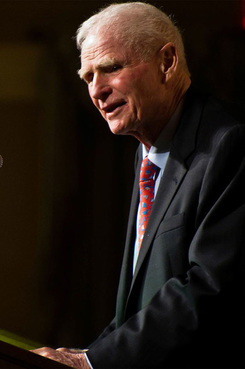Fellow Lawyers Remember Byrne for 'Raw Courage,' Building Character
Two-term New Jersey Gov. Brendan Byrne, celebrated for his accomplishments as executive but equally influential as a lawyer and mentor, is being remembered as steadfastly ethical and courageous by fellow practitioners.
January 05, 2018 at 04:00 PM
5 minute read
 Brendan Byrne
Brendan Byrne Two-term New Jersey Gov. Brendan Byrne, celebrated for his accomplishments as executive but equally influential as a lawyer and mentor, is being remembered as steadfastly ethical and courageous by fellow practitioners, including those who once worked with him in the Essex County Prosecutor's Office. He died Thursday at age 93.
Byrne had a reputation for ethical behavior, perhaps first earned when an organized crime figure, Angelo “Gyp” DeCarlo, was caught on tape saying—now famously—that Byrne couldn't be bribed.
But other, unheralded examples of his integrity abounded, it seems.
Justin Walder, who worked under Byrne as an assistant prosecutor in Essex, recounted one story: Walder said he was handling a death penalty case with two defendants, and that the state Supreme Court had ruled that certain discovery did not have to be made available to the defendants.
“I wasn't comfortable with that because it was a death penalty case, so I asked Brendan what to do,” said Walder, of Hackensack's Pashman Stein Walder Hayden.
“Give it to them,” Walder quoted Byrne as saying about the discovery materials. “Just do the right thing.”
Barry Evenchick, who also was an assistant prosecutor under Byrne, agreed about his reputation for insisting on ethical practices.
“He always gave the honest answer,” said Evenchick, also of Pashman Stein. ”That was his reputation.”
There are a phalanx of attorneys, he said, that matured under Byrne's tenure as prosecutor. “It's almost a cult,” Evenchick said.
“What stands out was his personal integrity and raw courage,” said former New Jersey Chief Justice James Zazzali, another of Byrne's former assistant prosecutors—and later, attorney general appointed by Byrne.
“He knew what was right,” added Zazzali, of Newark's Zazzali, Fagella, Nowak, Kleinbaum & Friedman.
Often remembered for shepherding through the legalization of casino gambling and for appointing Chief Justice Robert Wilentz to what would become the most influential state Supreme Court of the modern constitutional era in New Jersey, Byrne was a practicing lawyer first. He got his start as a private practitioner in Essex County, after serving in the military during World War II and graduating from Princeton University and Harvard Law.
A West Orange native, Byrne was admitted to the New Jersey bar in 1951.
Byrne, a Democrat, began his career in public service in October 1955, when he was appointed an assistant counsel to Gov. Robert Meyner, and later executive secretary. In 1958, Byrne was appointed the deputy attorney general responsible for the Essex County Prosecutor's Office. The next year, Meyner appointed him Essex County prosecutor.
From 1968 to 1970, Byrne served as the president of the Board of Public Utilities.
In 1970, Byrne was nominated by Gov. William Cahill, a Republican, to the Superior Court. He served as the assignment judge for Morris, Sussex and Warren counties. In April 1973, Byrne resigned from the Superior court to run for governor, ultimately defeating the Republican nominee, U.S. Rep. Charles Sandman.
During his first term, Byrne was responsible for enacting the state's income tax, which was used to pay for school funding. It was speculated that it would cost him a second term.
That proved not to be true. Byrne faced 10 opponents in the 1977 Democratic primary, including future Gov. James Florio. However, Byrne obtained the party's nomination, and went on to defeat Republican state Sen. Raymond Bateman in the general election.
It was during his second term that Byrne focused on the passage of the Pinelands Protection Act, the expansion of the state's interstate system and legalized gambling in Atlantic City.
After leaving office in 1982, Byrne became a senior partner at what became Carella, Byrne, Cecchi, Olstein, Brody & Agnello, in Roseland.
“We are all deeply saddened by Brendan's passing. He was a true patriot and a great defender of New Jersey,” Carella Byrne chairman Charles Carella said in a statement on behalf of the firm. “We will all miss his wit, wisdom and professionalism. It was an honor to be his friend and to practice law with him for over 58 years.”
Byrne also was a longtime member of the Law Journal's Editorial Board.
“As a long-time member of the editorial board, Governor Byrne was a leader, mentor and friend to us all—humble, funny, fair and wise,” said board chairwoman Rosemary Alito, of K&L Gates' Newark office, in a statement. “He showed us through his everyday actions what the best of public service and lawyering can be. He will be sorely missed.”
Republican Gov. Chris Christie, in a statement, said: “On a personal note, Mary Pat and I express our deepest condolences to his wife Ruthi and his entire family. I considered Governor Byrne a mentor and a friend. My life is richer for having known him as I am sure are the lives of every person who had the privilege to meet him.”
Senate President Steve Sweeney, D-Gloucester, also issued a statement, saying Byrne “provided strong and determined leadership at a pivotal time in the state's history, shaping policies on a wide range of issues that continue to have an influence on the quality of life to this day. Among his accomplishments were bringing casino gambling to Atlantic City, the creation of NJ Transit, the preservation of the Pinelands, public financing of gubernatorial campaigns, and passage of the state income tax to fund public schools and reduce property taxes.”
Byrne and his successor as governor, Republican Thomas Kean, co-wrote a column in The Star-Ledger of Newark, in which they discussed state and national politics. In 2016, Byrne lent his support to Christie's ultimately unsuccessful run for president, saying Christie was the “best candidate the Republicans have.”
Byrne is survived by his wife, Ruthi, three sons, three daughters and nine grandchildren.
This content has been archived. It is available through our partners, LexisNexis® and Bloomberg Law.
To view this content, please continue to their sites.
Not a Lexis Subscriber?
Subscribe Now
Not a Bloomberg Law Subscriber?
Subscribe Now
NOT FOR REPRINT
© 2025 ALM Global, LLC, All Rights Reserved. Request academic re-use from www.copyright.com. All other uses, submit a request to [email protected]. For more information visit Asset & Logo Licensing.
You Might Like
View All
AstraZeneca Files Flurry of Lawsuits to Protect Cancer Treatment Drug
3 minute read
In 2-1 Ruling, Court Clears Way for Decade-Old Wrongful Imprisonment Suit
5 minute read
Appellate Division Rejects Third Circuit Interpretation of NJ Law, Says No Arbitration for Insurance Fraud
4 minute read
Volkswagen Hit With Consumer Class Action Alleging Defective SUV Engines
3 minute readTrending Stories
- 1AstraZeneca Files Flurry of Lawsuits to Protect Cancer Treatment Drug
- 2American Airlines Legal Chief Departs for Warner Bros. Discovery
- 3New Montgomery Bar President Aims to Boost Lawyer Referral Service
- 4Deadline Extended for Southeastern Legal Awards
- 5Church of Scientology Set to Depose Phila. Attorney in Sexual Abuse Case
Who Got The Work
Michael G. Bongiorno, Andrew Scott Dulberg and Elizabeth E. Driscoll from Wilmer Cutler Pickering Hale and Dorr have stepped in to represent Symbotic Inc., an A.I.-enabled technology platform that focuses on increasing supply chain efficiency, and other defendants in a pending shareholder derivative lawsuit. The case, filed Oct. 2 in Massachusetts District Court by the Brown Law Firm on behalf of Stephen Austen, accuses certain officers and directors of misleading investors in regard to Symbotic's potential for margin growth by failing to disclose that the company was not equipped to timely deploy its systems or manage expenses through project delays. The case, assigned to U.S. District Judge Nathaniel M. Gorton, is 1:24-cv-12522, Austen v. Cohen et al.
Who Got The Work
Edmund Polubinski and Marie Killmond of Davis Polk & Wardwell have entered appearances for data platform software development company MongoDB and other defendants in a pending shareholder derivative lawsuit. The action, filed Oct. 7 in New York Southern District Court by the Brown Law Firm, accuses the company's directors and/or officers of falsely expressing confidence in the company’s restructuring of its sales incentive plan and downplaying the severity of decreases in its upfront commitments. The case is 1:24-cv-07594, Roy v. Ittycheria et al.
Who Got The Work
Amy O. Bruchs and Kurt F. Ellison of Michael Best & Friedrich have entered appearances for Epic Systems Corp. in a pending employment discrimination lawsuit. The suit was filed Sept. 7 in Wisconsin Western District Court by Levine Eisberner LLC and Siri & Glimstad on behalf of a project manager who claims that he was wrongfully terminated after applying for a religious exemption to the defendant's COVID-19 vaccine mandate. The case, assigned to U.S. Magistrate Judge Anita Marie Boor, is 3:24-cv-00630, Secker, Nathan v. Epic Systems Corporation.
Who Got The Work
David X. Sullivan, Thomas J. Finn and Gregory A. Hall from McCarter & English have entered appearances for Sunrun Installation Services in a pending civil rights lawsuit. The complaint was filed Sept. 4 in Connecticut District Court by attorney Robert M. Berke on behalf of former employee George Edward Steins, who was arrested and charged with employing an unregistered home improvement salesperson. The complaint alleges that had Sunrun informed the Connecticut Department of Consumer Protection that the plaintiff's employment had ended in 2017 and that he no longer held Sunrun's home improvement contractor license, he would not have been hit with charges, which were dismissed in May 2024. The case, assigned to U.S. District Judge Jeffrey A. Meyer, is 3:24-cv-01423, Steins v. Sunrun, Inc. et al.
Who Got The Work
Greenberg Traurig shareholder Joshua L. Raskin has entered an appearance for boohoo.com UK Ltd. in a pending patent infringement lawsuit. The suit, filed Sept. 3 in Texas Eastern District Court by Rozier Hardt McDonough on behalf of Alto Dynamics, asserts five patents related to an online shopping platform. The case, assigned to U.S. District Judge Rodney Gilstrap, is 2:24-cv-00719, Alto Dynamics, LLC v. boohoo.com UK Limited.
Featured Firms
Law Offices of Gary Martin Hays & Associates, P.C.
(470) 294-1674
Law Offices of Mark E. Salomone
(857) 444-6468
Smith & Hassler
(713) 739-1250






